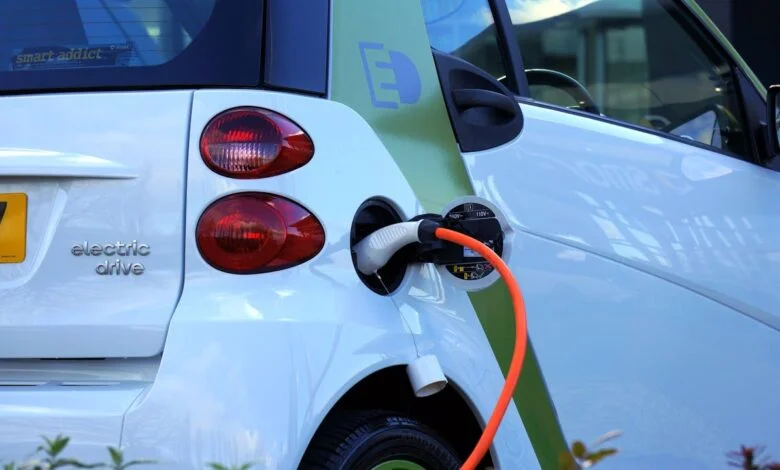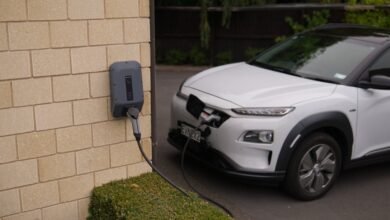EV Cost Savings: Driving Into a Greener, More Affordable Future

Find out how electric vehicles are changing what personal transport is all about and how we can change our thinking and even our pocketbooks in the UK without worsening the environment. This complete guide discusses the economics behind making the switch to electric; the savings, operating costs and the future value.
Introduction The Electric Revolution
The scene in the UK car industry is in a major change. As the government makes its promise of prohibiting new petrol and diesel car sales by 20351, electric cars (EVs) can no longer be seen as an environmental statement anymore, quite the other, it is becoming an economic necessity. To the UK drivers, it is not whether to become electric, but when.
There has never been a better financial case of EVs. According to recent studies, it has been revealed that the usage of electric-powered vehicles cost half as much as using similar petrol-guzzling ones on annual basis through an average fair of running of 1154 per year against 2316 respectively when using conventional vehicles. This is a paradigm shift where the concept of being environmentally responsible completely becomes in line with financial conservatism.
Fuel Cost Renovations: The Figures Do Not Deceive
The best and more obvious advantage of adopting an EV is that fuel expenses will be extremely less. It costs an average of 627 pound per year to charge an electric car which is low as compared to the 1971 pound used by a conventional petrol engine3. This is a saving of more than 1300pounds on fuel per year.
To further simplify things, in comparison, electric cars are about 6p per mile to operate as opposed to the 12p per mile the petrol cars cost4. In case drivers are recording 10,000 miles of distance per year, this will come down to fuel savings of a staggering 600 pounds. This disparity is increased further when home charging and specialised tariffs are used.
The benefits of home charging are especially strong. With the help of a special EV tariff, drivers can charge with a price that may go as low as 7.5p per kWh during non-peak hours that is much cheaper compared to charging, which is priced 45-69p per kWh in a public charging point. Most EV owners (92%) do their charging at home, benefiting the most out of such savings.
Servicing and Maintenance: More is Less
The other costs that would be saved significantly with the use of electric vehicles would be maintenance. Lower mechanical parts result in EVs, which are as low as 40 percent cheaper in terms of servicing and maintenance1. Maintenance cost is very low since the vehicle does not require oil changes, spark plugs, timing belts and complex exhaust systems.
The costs of EV annual maintenance are 18 percent lower than the of petrol and diesel counterparts, and the savings of 150-200 pounds a year are common. The reason behind this is that electric motors possess one moving part unlike thousands in internal combustion engines hence they have fewer wear and tear.
This is one of the major advantages that many manufacturers are realising since they are adopting longer service intervals. An example is Ford, which offers two-year unlimited service visits to their electric vehicles, which saves owners the cost and gives them a sense of security.
Tax benefits and incentives
The UK government has a variety of financial incentives set up which make EV ownership more appealing:
Benefits of the incentive The benefits of vehicle excise duty (VED) are substantial to any new electric car when they are registered after 1 April 2025. The first-year fee of EV is only 10 pounds as opposed to 110-1000 or more on the hybrid, petrol, or diesel-powered cars1. All the cars after the first year pay the generic rate of 195 per year.
The congestion charges also offer extra savings to city drivers. The EVs are eligible to the cleaner vehicle discount on the London congestion charge until December 20251 and are also charged at a reduced rate in clean air zones in the UK.
An electric vehicle not only saves costs but also provides convenience bonuses since many local authorities provide free parking and access to bus lanes as well, collecting over time.
Smart Charging Solutions
The future of EV cost savings lies in smart charging technology. Recent research by EY and Eurelectric reveals that smart charging solutions could save UK EV owners more than £10,000 over seven years6 through Time of Use (ToU) tariffs and vehicle-to-grid (V2G) technology.
The savings vary by vehicle size:
- Compact EVs: Over £700 annually
- Family EVs: More than £1,000 per year
- Large EVs/SUVs: Up to £1,475 annually6
These technologies allow EVs to not only consume energy efficiently but also sell surplus energy back to the grid, creating a new revenue stream for owners whilst supporting grid stability.
Total Cost of Ownership Analysis
When considering the complete ownership experience, EVs demonstrate superior value despite higher upfront costs. The average lifetime ownership cost for an EV in the UK is £52,133 compared to £53,625 for an equivalent petrol car7 over 14 years.
This translates to annual costs of £3,752 for EVs versus £3,858 for petrol cars, representing annual savings of £1067. However, more recent data suggests these savings are accelerating as EV technology improves and petrol prices rise.
Insurance considerations show EVs cost approximately 25% more to insure due to higher repair costs and specialised components7. However, this premium is offset by the substantial savings in fuel and maintenance costs.
Environmental Benefits with Financial Returns
The environmental advantages of EVs create additional financial benefits. With zero tailpipe emissions1, EVs contribute to improved air quality whilst helping the UK achieve its net-zero emissions target by 20508.
This environmental benefit translates to financial advantages through:
- Reduced exposure to future carbon taxes
- Access to low-emission zones
- Potential insurance discounts for environmentally responsible driving
- Higher resale values as environmental regulations tighten
Future-Proofing Your Investment
The UK’s commitment to phasing out petrol and diesel vehicles makes EVs a future-proof investment. With 80% of new car sales expected to be zero-emission by 20308, early adopters benefit from:
- Avoiding future restrictions on petrol and diesel vehicles
- Access to the most advanced charging infrastructure
- Better resale values as demand for EVs increases
- Protection against rising fossil fuel costs
Cost Comparison Table
| Cost Category | Electric Vehicle | Petrol Vehicle | Annual Savings |
|---|---|---|---|
| Fuel/Energy | £6273 | £1,9713 | £1,344 |
| Maintenance | £150-200 less4 | Standard | £150-200 |
| VED (First Year) | £101 | £110-£1,000+1 | £100-£990+ |
| Insurance | 25% higher7 | Standard | -£200-£300 |
| Total Annual Running Costs | £1,1542 | £2,3162 | £1,162 |
Based on 10,000 miles annual driving and home charging with EV tariff
Frequently Asked Questions
Q: How much can I save annually by switching to an EV?
A: UK drivers can save approximately £1,162 annually on running costs2, with fuel savings alone reaching £1,344 per year3 when comparing EVs to petrol vehicles.
Q: Is home charging really that much cheaper?
A: Yes, home charging with an EV tariff costs around 7.5p per kWh4 compared to 45-69p per kWh at public charging stations. Some tariffs offer rates as low as 2.1p per mile5.
Q: What about the higher purchase price of EVs?
A: Whilst EVs have higher upfront costs (averaging £5,000 more7), the total lifetime ownership cost is lower due to reduced running expenses. The average EV costs £52,133 over 14 years compared to £53,625 for petrol cars7.
Q: Are there government incentives available?
A: Yes, including reduced VED rates (£10 vs £110-£1,000+ for first year1), congestion charge exemptions1, and grants for home charging point installation.
Q: How much do EVs cost to maintain?
A: EVs have up to 40% lower servicing costs1 due to fewer mechanical components, with typical annual savings of £150-2004 compared to petrol and diesel vehicles.
Q: What about insurance costs?
A: EV insurance is approximately 25% higher7 due to specialised components and repair costs, but this is offset by substantial fuel and maintenance savings.
Q: Can I make money from my EV?
A: Yes, through smart charging solutions and vehicle-to-grid technology, EV owners can sell surplus energy back to the grid, potentially saving over £10,000 over seven years6.
Q: How do charging costs compare to petrol?
A: Electric vehicles cost about 6p per mile compared to 12p for petrol cars4. For 10,000 annual miles, this represents £600 in fuel savings.
Conclusion: Your Road to Savings
The transition to electric vehicles represents more than an environmental choice—it’s a sound financial decision that delivers immediate and long-term benefits. With annual running cost savings exceeding £1,000, reduced maintenance requirements, and government incentives, EVs offer compelling value for UK drivers.
The numbers speak for themselves: 50% lower running costs, £1,344 annual fuel savings, and up to 40% reduced maintenance expenses. As charging infrastructure expands and smart charging technologies mature, these savings will only increase.
The question isn’t whether EVs will become the dominant choice for UK drivers—it’s whether you’ll be an early adopter who maximises the financial benefits or wait until the advantages become common knowledge. With the ban on new petrol and diesel sales approaching, the time to switch is now.
Your journey to a greener, more affordable future starts with a single decision. The road ahead is electric, and it’s paved with savings.

